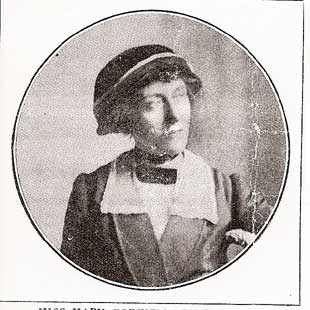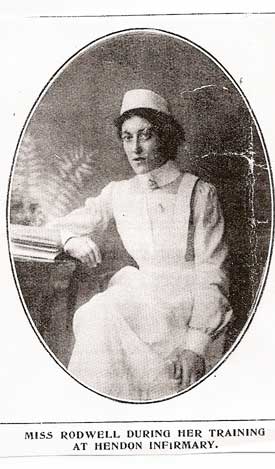Both articles are included here, to really flesh out the fantastic role played by four intrepid and brave nurses in the sinking of the Hospital Ship Anglia.
November 27, 1915. THE NURSING TIMES. p 1457.
WRECK OF A HOSPITAL SHIP.
Survivors' Stories of Nurses' Heroism. ( From a Correspondent )
The stories told by the wounded men who were saved from the Hospital ship ANGLIA show that the four nurses on board displayed the greatest courage and devotion.
The horror of that first moment must have been indescribable when the doomed vessel plunged her bows into the water at an angle which suggested her instant death, and the staff were faced with the problem of getting nearly 200 cot cases up from wards and lower wards in almost impossible conditions.
The water at once rushed into the lowest wards, and the orderlies who went to investigate reported that it was up over their heads. From the other wards every man who could move himself scrambled as best he could to the deck, and someof the wounded, officers and men alike, did all in their power to save the others, hunting out lifebelts for them and fastening them on.
All the time the Nurses were working steadily, chiefly concerned with the lifebelts, but bringing up all the wounded who could be moved along those slanting corridors.
" They were wonderful " say the men. " They worked like slaves, and they would not think about themselves. I believe they, with the R.A.M.C. officers and the Captain, were the very last to leave the ship."
" The Nurses worked magnificently " said another, " but you have no idea of the difficulty of their task. Imagine, there was no place on deck where the wounded could be safely put except just beside the rail. " The men mention each sister by name, the Matron, Mrs. Mitchell, Nurse Walton, Nurse Meldrum, and Nurse Rodwell, each as having been conspiciously brave. They would not use the lifebelts themselves, but insisted on giving them to the men, and when the destroyers came hastening out from Dover to take the wounded to safety, the Nurses refused to leave the ship. They would stay with their men, they said. Nurse Rodwell had been injured in the explosion and was drowned.
" I offered to help one Nurse " said a soldier, I said " You come with me and I'll get you to safety. I am a very strong swimmer. You'll be safe with me. But she shook her head and said she could not leave her men. So she was with them to the last. "
After all, of course, the strongest testimony to the pluck and efficiency of the Nurses and R.A.M.C. staff is the lengthy list of " saved. "
The Matron, with R. A. M. C. officers went through all the wards that were not submerged, and assured themselves that no living man was left. The rescue of so many wounded was a most marvellous achievement.
There were some marvellous escapes. One young Canadian was in the water three times. He jumped into the water from Anglia, was picked up and taken to the Lusitania, which blew up as soon as he got on her deck; he was thrown into the water once more, and was presently picked up by a boat which immediately capsized. Little wonder that he did not feel safe till he was in an ambulance train. Another man, pointed out as a hero who had helped to provide lifebelts for many of the men, told me that one of those had both legs in splints, but he was picked up by a boat and brought safely to hospital.
A man who was carried on to the ship in a state of exhaustion, the result of three weeks' pneumonia and pleurisy, told me how he dragged himself up to the deck and clung to the rail, hesitating to take the fatal plunge into the icy water. The doctors at Epsom were astounded to find how little harm the immersion had done him.
A severe rheumatic case who had escaped in the scantiest attire declared that the experience which should have killed him had almost done him good.
The horror and the ghastliness, of course, was connected with the wrecking of the wounded, and the survivors describe sights which were worse than anything they had seen in Flanders. One does not know what precautions are taken to secure the lowering of boats when a vessel has a list, but in view of the Secretary of the Admiralty had just said about the expected attacks by German submarines of British Hospital ships, it is to be supposed that the most stringent regulations are in force.
Mention should be made of the sisters in the Hospital ship-name not given-which was lying at Dover freshly filled with patients. The Anglia men were brought here to wait for the hour and a half before the ambulance train arrived, and when the men snugly tucked up in cots were asked if they would give them up to the Anglia company they " eagerly crawled out of their beds. " That naturally meant a great deal of work for the ship's staff, but, needless to say they too worked like Trojans, delighted to have the chance of helping their poor guests.
Private Finnar, speaking to a representive of the Weekly Dispatch, said:- " In my ward there was one Sister and two orderlies. The Sister worked like a lion. As long as I live I shall never forget her. In about 7 minutes she had me extricated. When I got on deck I saw two Sisters and the Matron fastening on lifebelts and assisting the helpless men. They never gave a thought for themselves. They moved about with quick, workmanlike movement, no flustering- not for a moment did they lose their heads. They presented a sight I shall never forget-faces white as death, hair blowing loose in the bitterly cold wind, and their hands and aprons literally covered with the blood of the men they were helping.
" I begged the Matron and two Sisters to get into the boat which had come alongside.
They wouldn't hear of the suggestion. Not until the water was lapping over my feet did I slide off, and up to then not a single Nurse had left her post in the sinking ship.
It was heartrending to see their singleminded devotion to the wounded chaps under their care. " No! " said the last Nurse I spoke to aboard Anglia, " Our duty is to see you men off safe- we have the right to be last this time! "
December 11, 1915. The British Journal of Nursing. p 483.
OUR ROLL OF HONOUR.
Our portraits of the late Miss Mary Rodwell of Q.A.I.M.N.S.R., the one in uniform taken in her training days, and the other more recently, will be welcomed both by those who knew her, and also to many who will like to know what manner of woman was the Nurse that went to her death so bravely.

Mary Rodwell in Training

Mary Rodwell at Hendon
Miss Rodwell was born at Brockdish, in Norfolk, on June 17th. 1874. Trained at the Hendomm Infirmay from 1901/1904, she afterwards worked at the Samaritan Free Hospital, Marylebone Road W; and later in private nursing homes, and as a private nurse. She was also a certificated masseuse.
She was a true nurse, and always had the interests of her patients closely at heart.
Relatives of Miss Rodwell who have seen the Matron and Sisters from Anglia, say they cannot speak too highly of her. The last the Matron saw of her was shortly before the explosion, she came up to fetch some warm woolies for her patients. She was in charge of 200 cot cases, and her last moments was spent in caring for them, as when the explosion came she was administering to the wounded. She died the death she would have wished for her King and Country, doing her duty to the last moment. One who knew her writes : " I never met a more loveable, unselfish noble woman.
Her patients filled her whole heart and soul. She constantly studied them and did all in her power for them. Self was never thought of. When private nursing her patients could not speak too highly of her personally, or of her abilities as a nurse. She often spoke of her very happy days at Hendon. I think they were really her happiest days."
When war broke out she felt it her duty to volunteer for foreign service, and was from February to May on hospital trains, since which time she has served in Anglia. We all feel proud that she died so noble a death, and that we have such sweet memories of her, but we deeply mourn her loss.
A colleague in France writes: We are having it very cold out here now, and had quite a heavy snow fall several days ago, and of course " trench foot" has started. How dreadful about Anglia. Quite a number of patients from this hospital were on board. She had been waiting for days before she could get away."
AN APPRECIATION.
By the Matron of the Training School.
Miss Elma Smith, Matron of the Hendon Infirmary, writes:-
DEAR EDITOR,
I want to tell you how much we all appreciate your kind expression of sympathy with us all- both relatives and friends- in the loss of Nurse Rodwell.
She herself could wish for no better end than to die with her patients under her care. We all know what a keen sense of duty she possessed. Nothing was ever a trouble to her where her patients were concerned, and she was kind, firm and sympathic to a degree. She gave all she could at all times to help and comfort those in trouble and need.
We all miss her greatly, as she was one of the keenest members of our Nurses' League. I wonder if you know, too, how much she appreciated your work in the cause of women, especially nurses. She was an ardent registrationist and never lost an opportunity of advocating the cause. Besides this she always supported THE BRITISH JOURNAL OF NURSING from the time she came here to train. Then, too, she was an enthusiastic Suffragist. There are many who can tell you how, in a quiet way she did so much for her fellow workers.
I can only add my expression of sincere regard, and at the same time thank you sincerely for all you have said of her.


